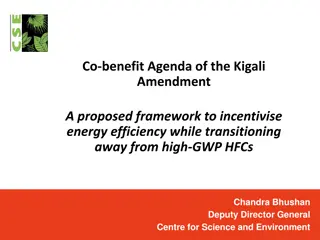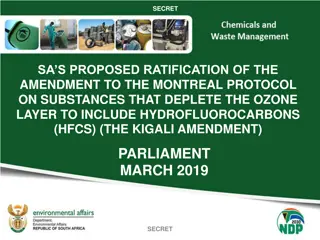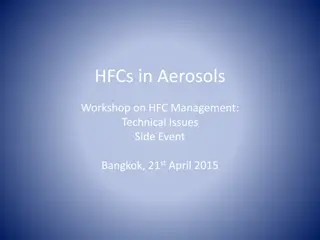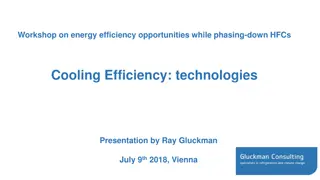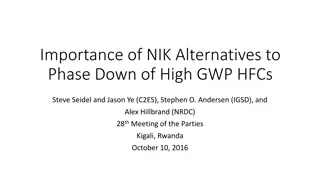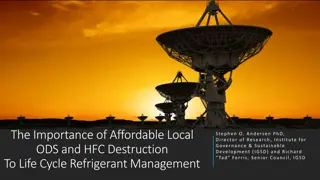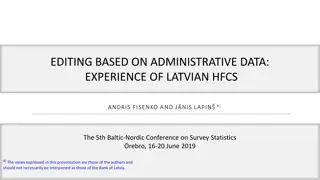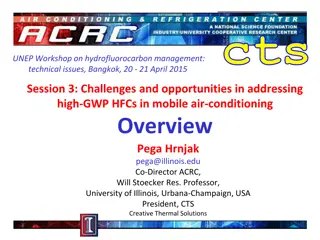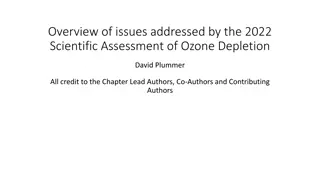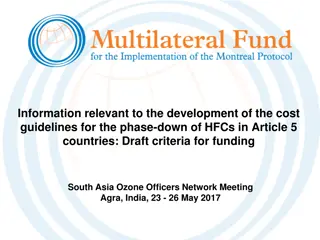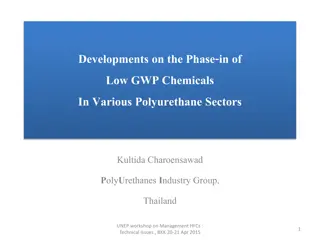Transitioning Towards Energy Efficiency: Co-Benefit Agenda of the Kigali Amendment
The Kigali Amendment proposes a framework to incentivize energy efficiency while phasing out high-GWP HFCs. Reports highlight the urgency to limit global warming to 1.5°C, emphasizing the need for deep emission reductions across all sectors. Investments in low-carbon technologies and energy efficie
0 views • 17 slides
Proposed Ratification of the Kigali Amendment to the Montreal Protocol
South Africa seeks Parliament's approval to ratify the Kigali Amendment to the Montreal Protocol, targeting the phase-down of hydrofluorocarbons (HFCs) to protect the ozone layer. The amendment requires new reporting on HFC production, imports, and exports, with different baselines for developing co
0 views • 10 slides
Understanding Aerosols: Types, Applications, and Environmental Impact
Aerosols play a significant role in various industries and applications, utilizing different propellants and technologies. This workshop discussed the management of HFCs in aerosols, highlighting technical aspects and not-in-kind technologies. The aerosol sector encompasses consumer, technical, and
0 views • 26 slides
Workshop on Energy Efficiency Opportunities in Phasing Down HFCs: Cooling Efficiency Technologies Presentation
Presentation by Ray Gluckman at a workshop held in Vienna on July 9th, 2018, highlighted the significant potential to improve efficiency in cooling systems while phasing down HFCs. The session covered key principles, examples of efficiency improvements, impact on capital costs, and factors influenci
0 views • 27 slides
Importance of NIK Alternatives in Phase Down of HFCs
NIK alternatives play a crucial role in phasing down high GWP HFCs, with a focus on next-generation solutions like HFOs and HFO/HFC blends. These alternatives have zero ODP and low GWP, making them effective replacements for various sectors. Regulations in the EU, US, Japan, and Canada are driving t
0 views • 15 slides
Sustainable Refrigerant Management: Local Destruction & Montreal Protocol Strengthening
Explore the significance of affordable local destruction of ozone-depleting substances (ODSs) and HFCs for life cycle refrigerant management. Learn about the importance of strengthening the Montreal Protocol to mitigate climate impacts. Discover key takeaways for preventing climate tipping points, p
0 views • 17 slides
Latvian Household Finance and Consumption Survey Experience by Andris Fisenko and J. Nis Lapi
Latvian HFCS, a joint project of Bank of Latvia and Central Statistical Bureau, aims to gather micro-level data on households' assets and liabilities every three years. The survey includes person-level and household-level data, with a focus on economic decisions. Despite a low response rate, the sur
0 views • 27 slides
Challenges and Opportunities in Addressing High-GWP HFCs in Mobile Air Conditioning: Insights from UNEP Workshop
The UNEP workshop in Bangkok discussed technical issues related to high-GWP HFC management in mobile air conditioning. Experts highlighted the pressure for GWP reduction in Europe, the historical competition between CO2 and R134a, and advancements in technology over the past decade in refrigerant sy
0 views • 9 slides
Insights from 2022 Scientific Assessment of Ozone Depletion
The 2022 Scientific Assessment of Ozone Depletion, led by David Plummer, addresses key issues like Ozone Depleting Substances, HFCs, Global and Polar Stratospheric Ozone, Climate Impacts, Stratospheric Aerosol Injection, and more. Chapter details reveal decreasing trends in Ozone Depleting Substance
0 views • 12 slides
Development of Cost Guidelines for HFC Phase-down in Article 5 Countries
Draft criteria for funding the South Asia Ozone Officers Network Meeting in Agra, India focused on developing guidelines for the phase-down of HFCs in Article 5 countries. The document outlines elements of decision XXVIII/2, including overarching principles, flexibility in implementation, eligible c
0 views • 38 slides
Challenges and Solutions in Transitioning to Low GWP Chemicals in Polyurethane Sectors
Beginning in 2015, Thai foam enterprises faced challenges in adopting low GWP chemicals as alternatives to HCFC-141b. Choices included CP and HFC-245fa, each with cost and feasibility considerations. The transition necessitated careful selection of alternative blowing agents based on costs, investme
0 views • 5 slides
Insights from HFC Stakeholder Survey December 2022
Causeway Solutions conducted an online survey of HFC stakeholders impacted by U.S. EPA decisions on HFC allocations. Key takeaways show stakeholders' views on HFC prices, inclusion of historical data in allocation methodologies, preference for suppliers, and stockpiling of HFCs for a smooth transiti
0 views • 15 slides
